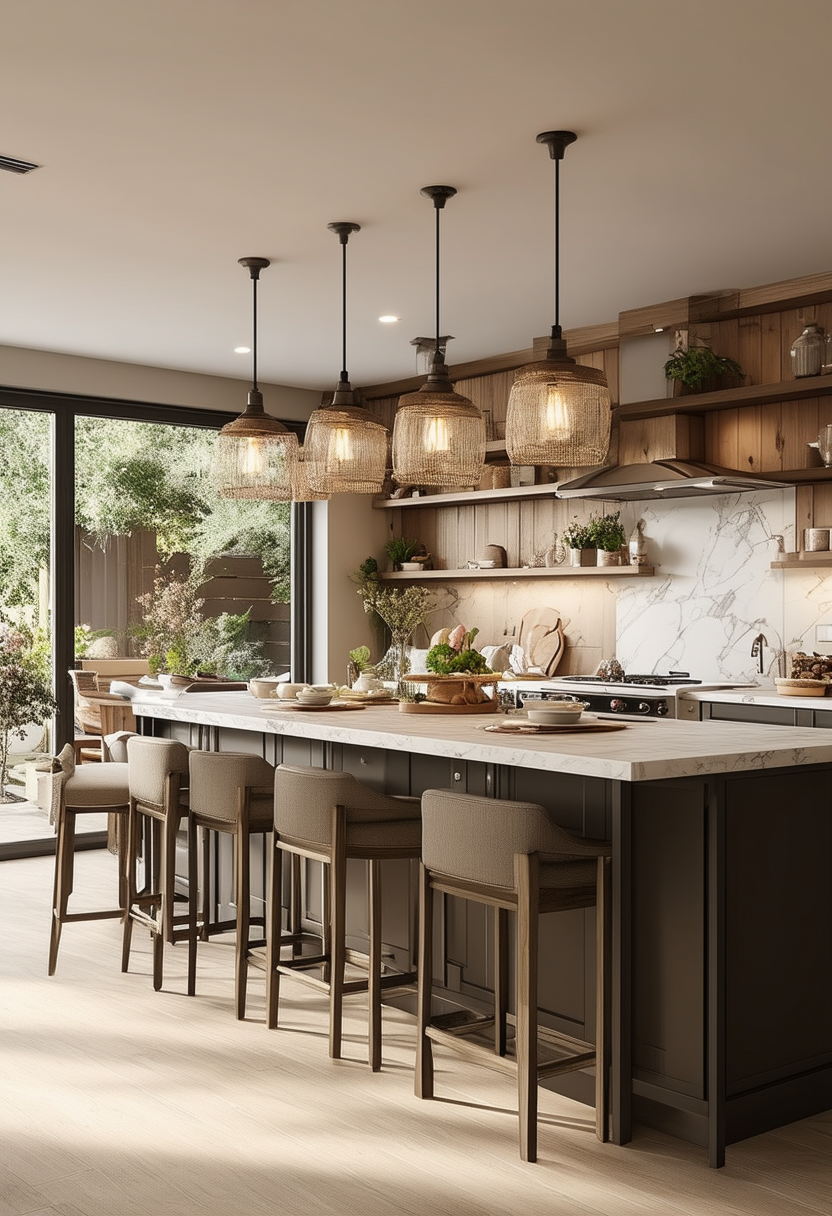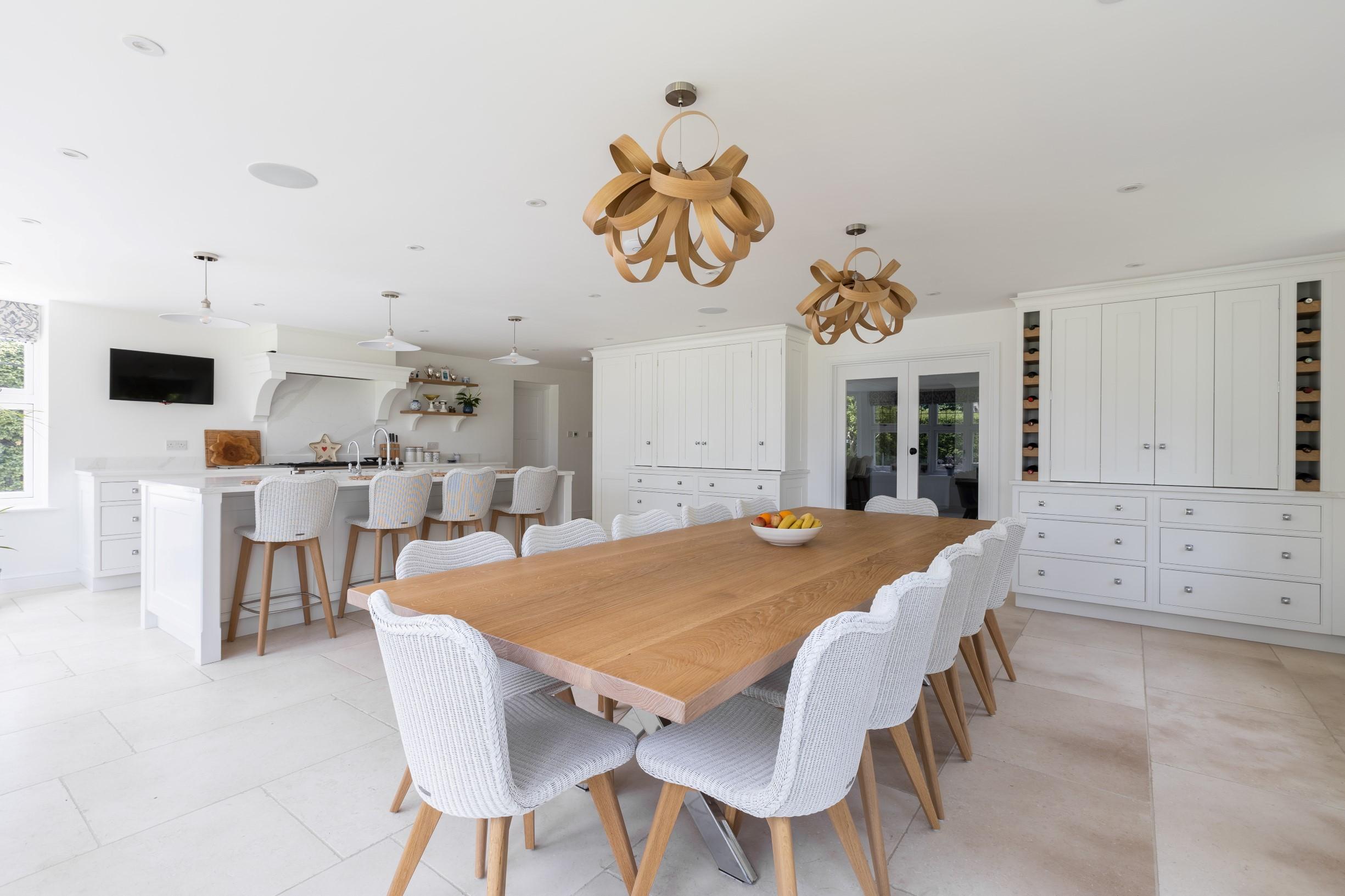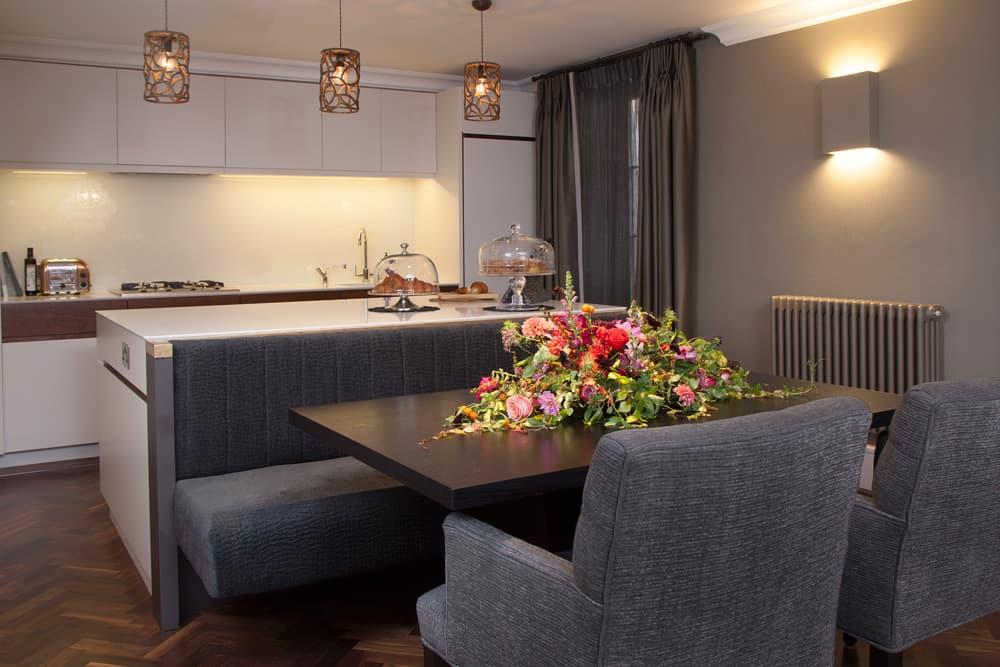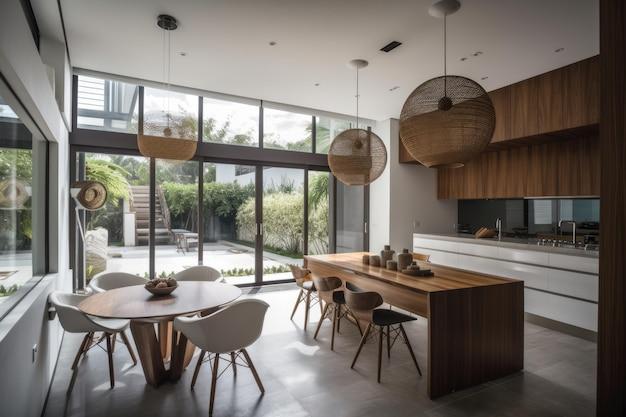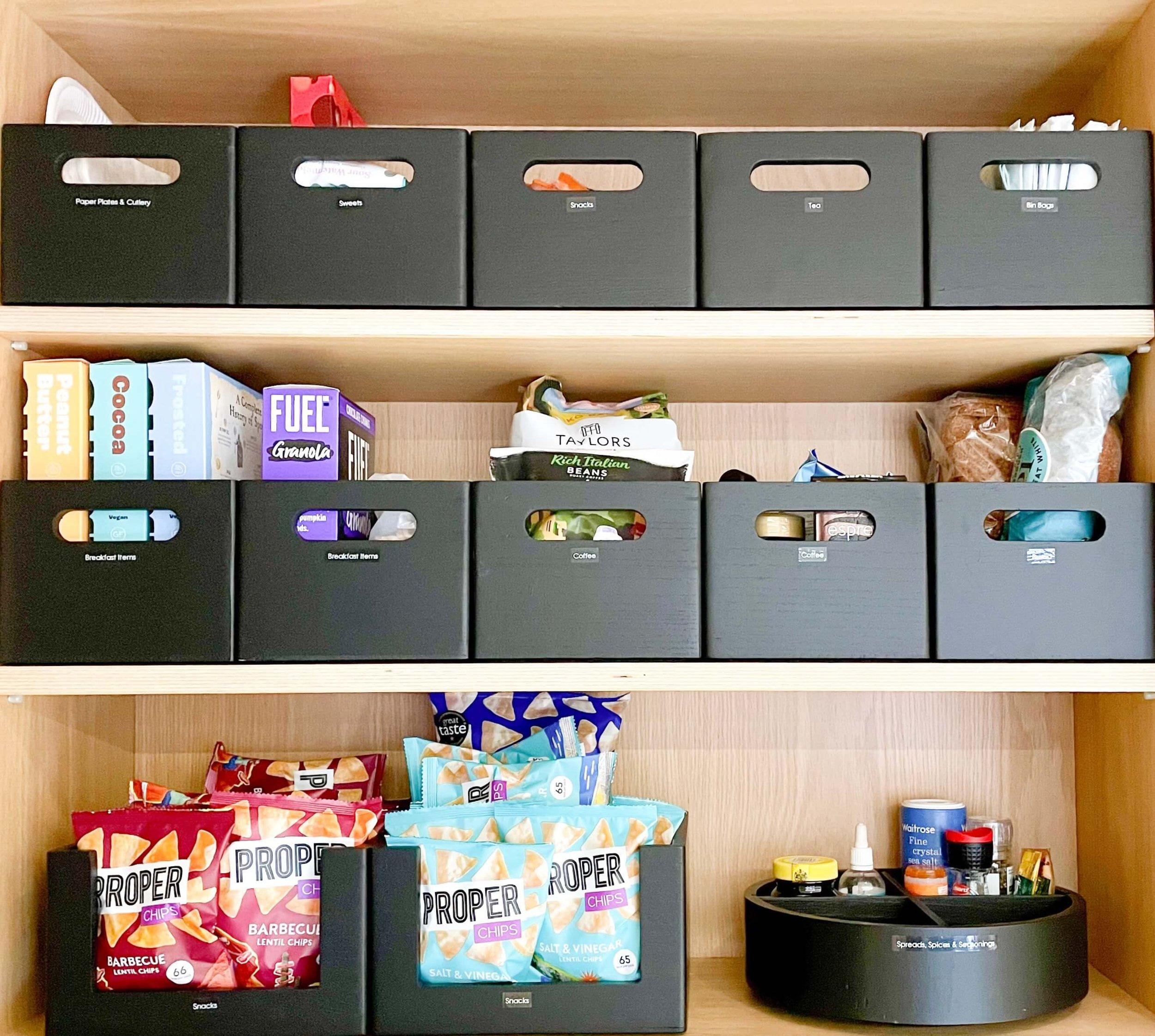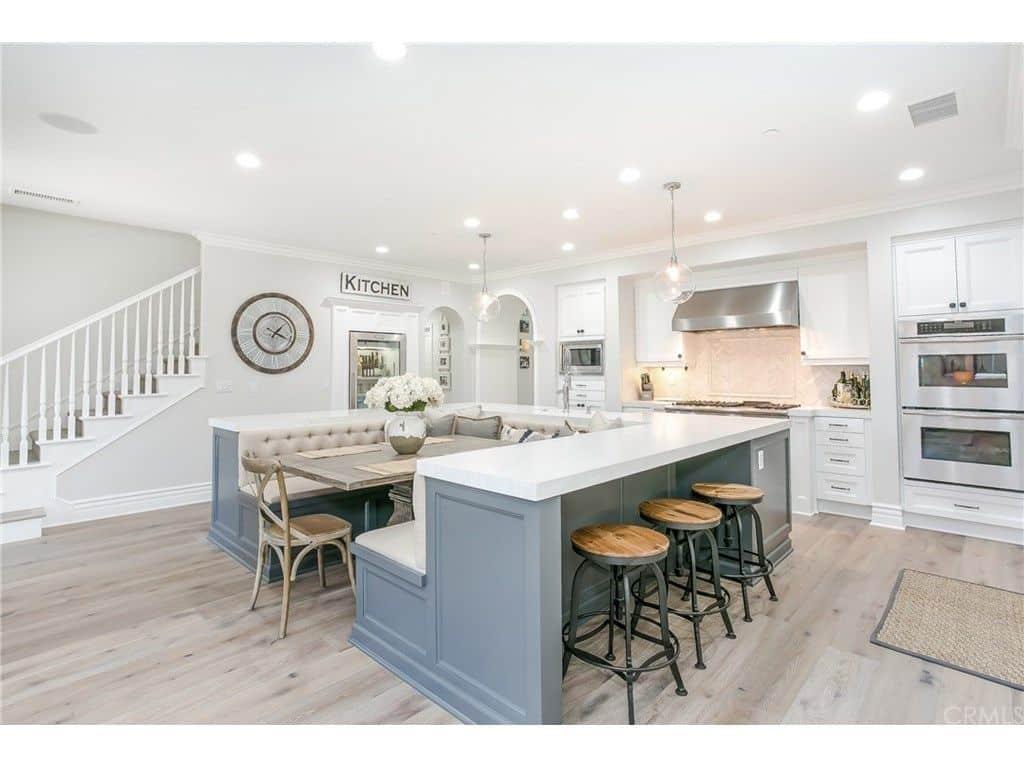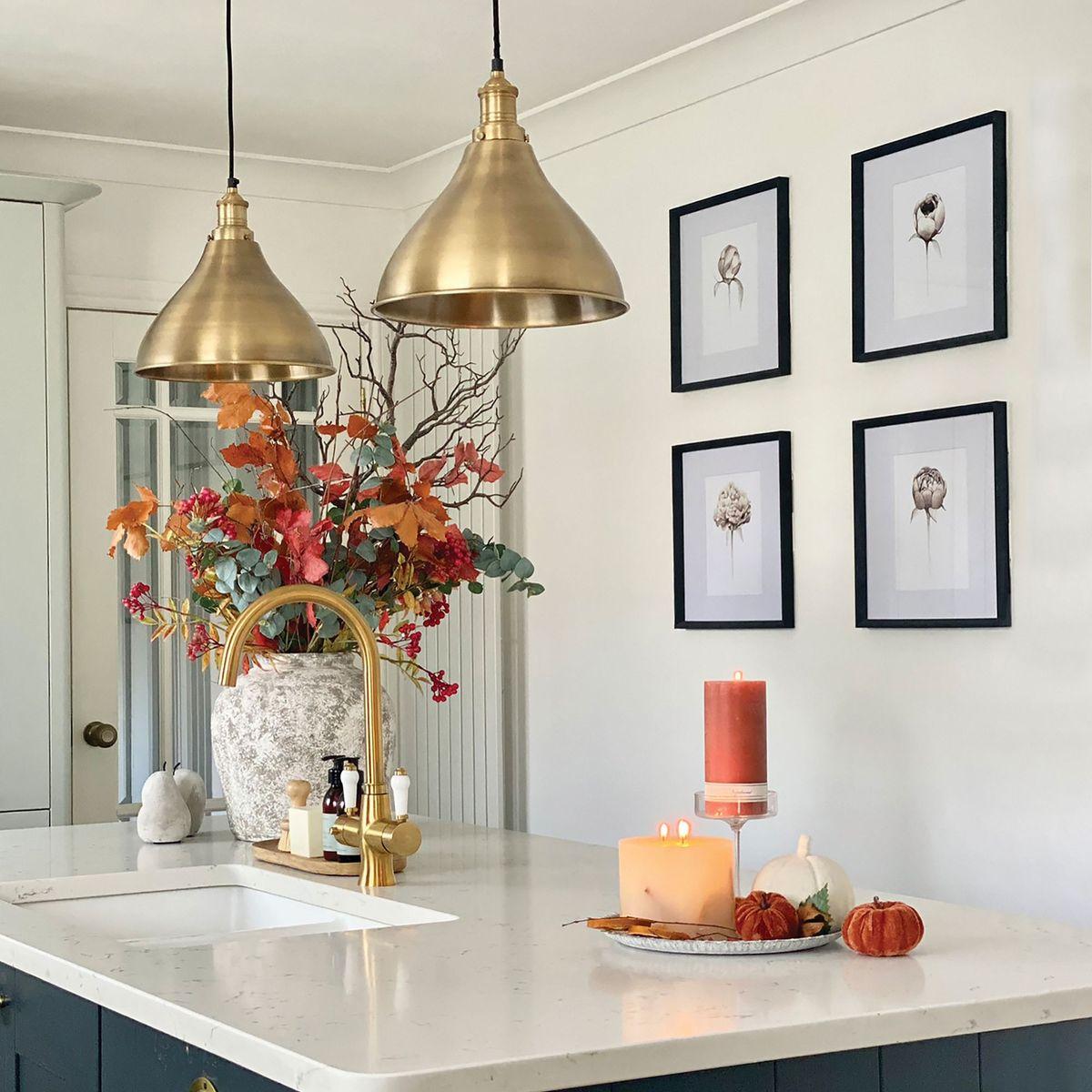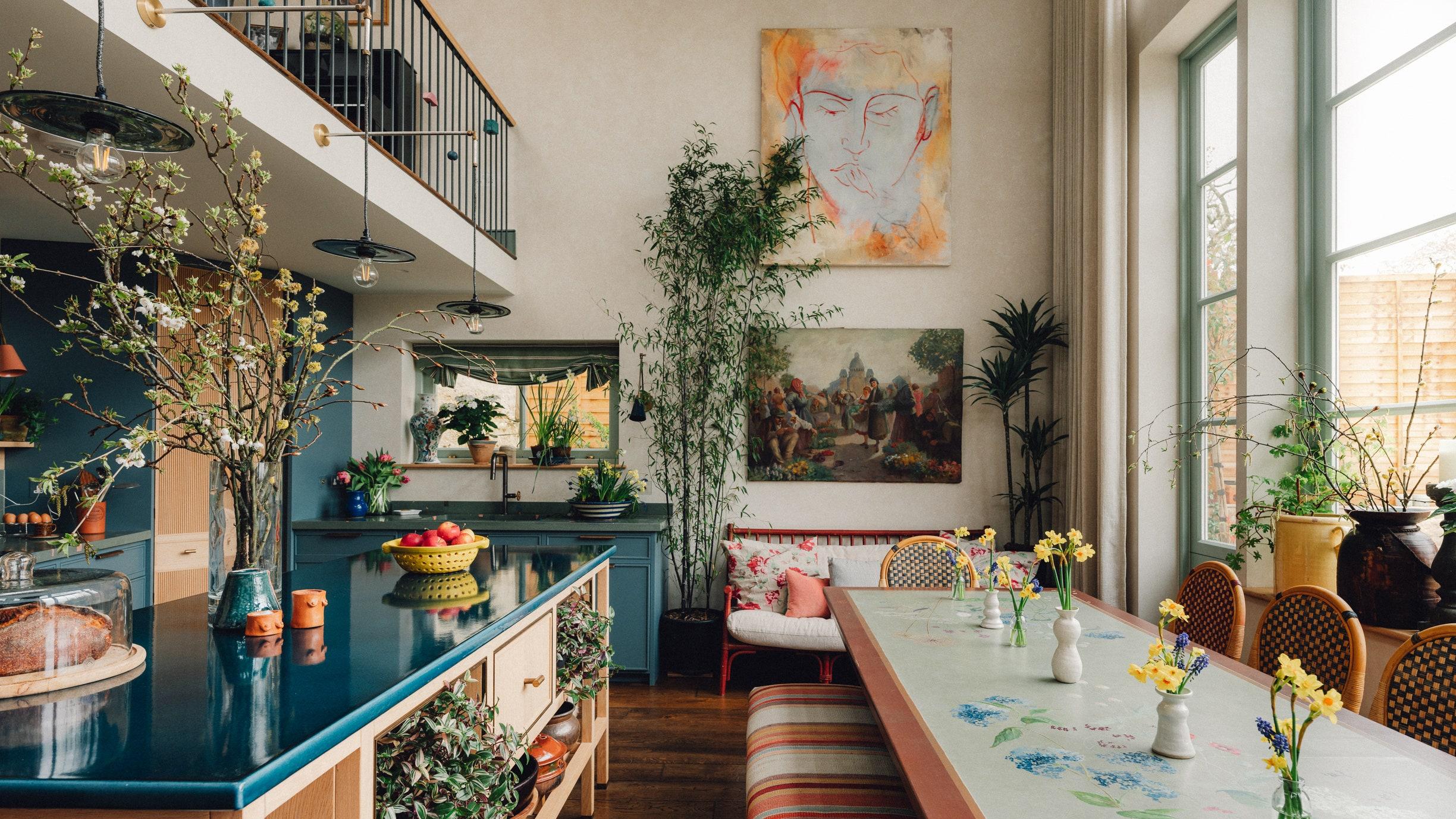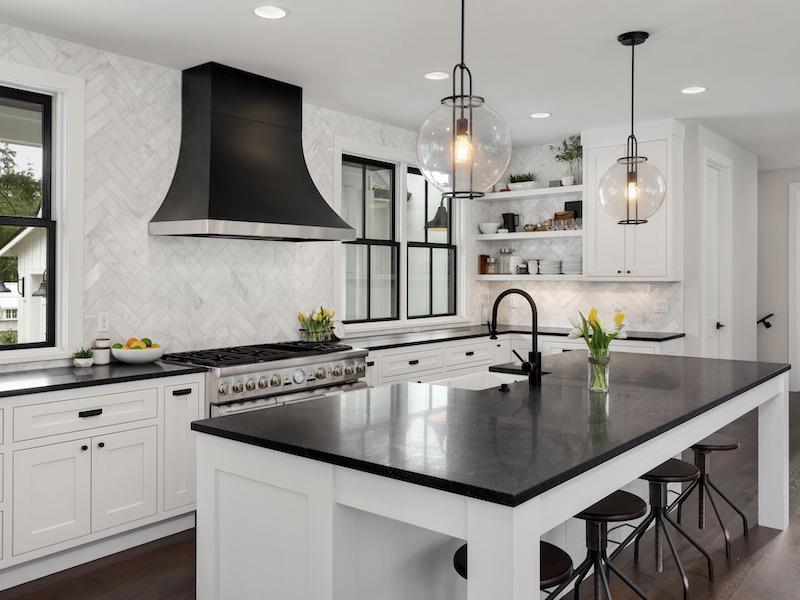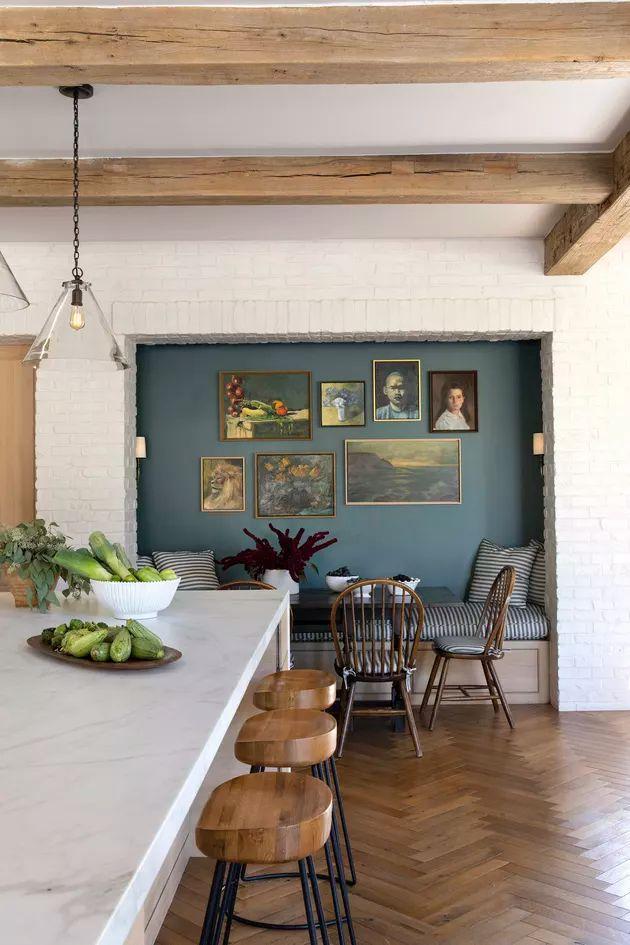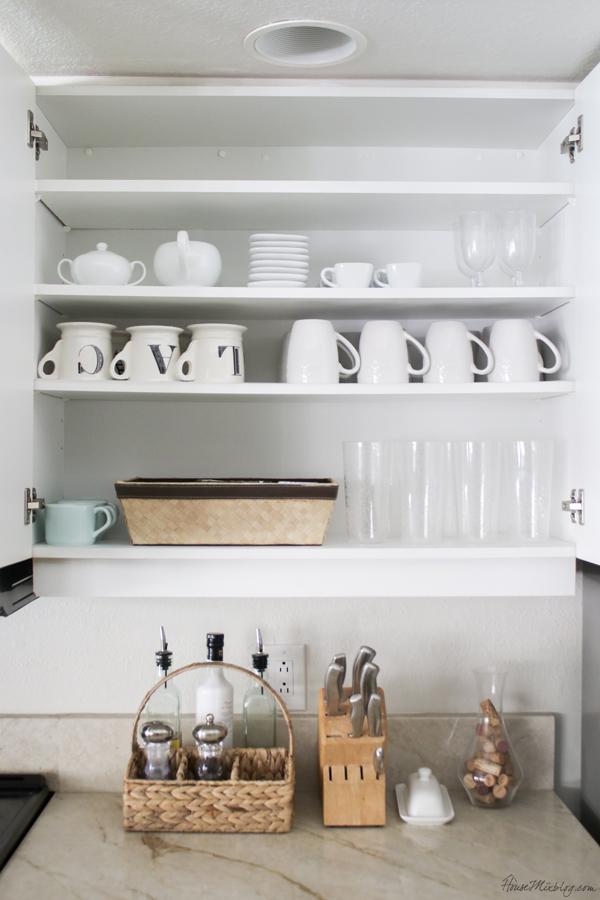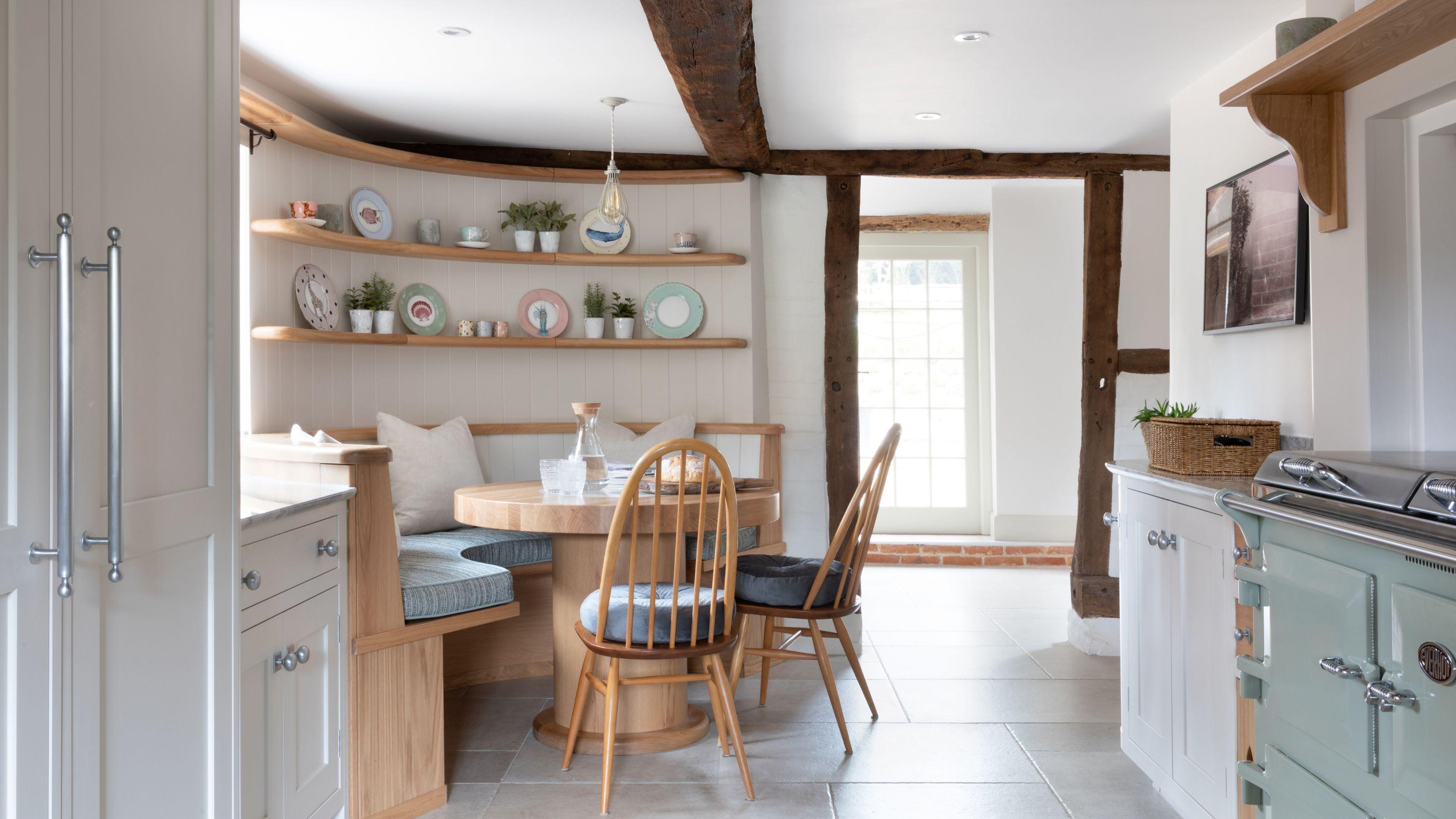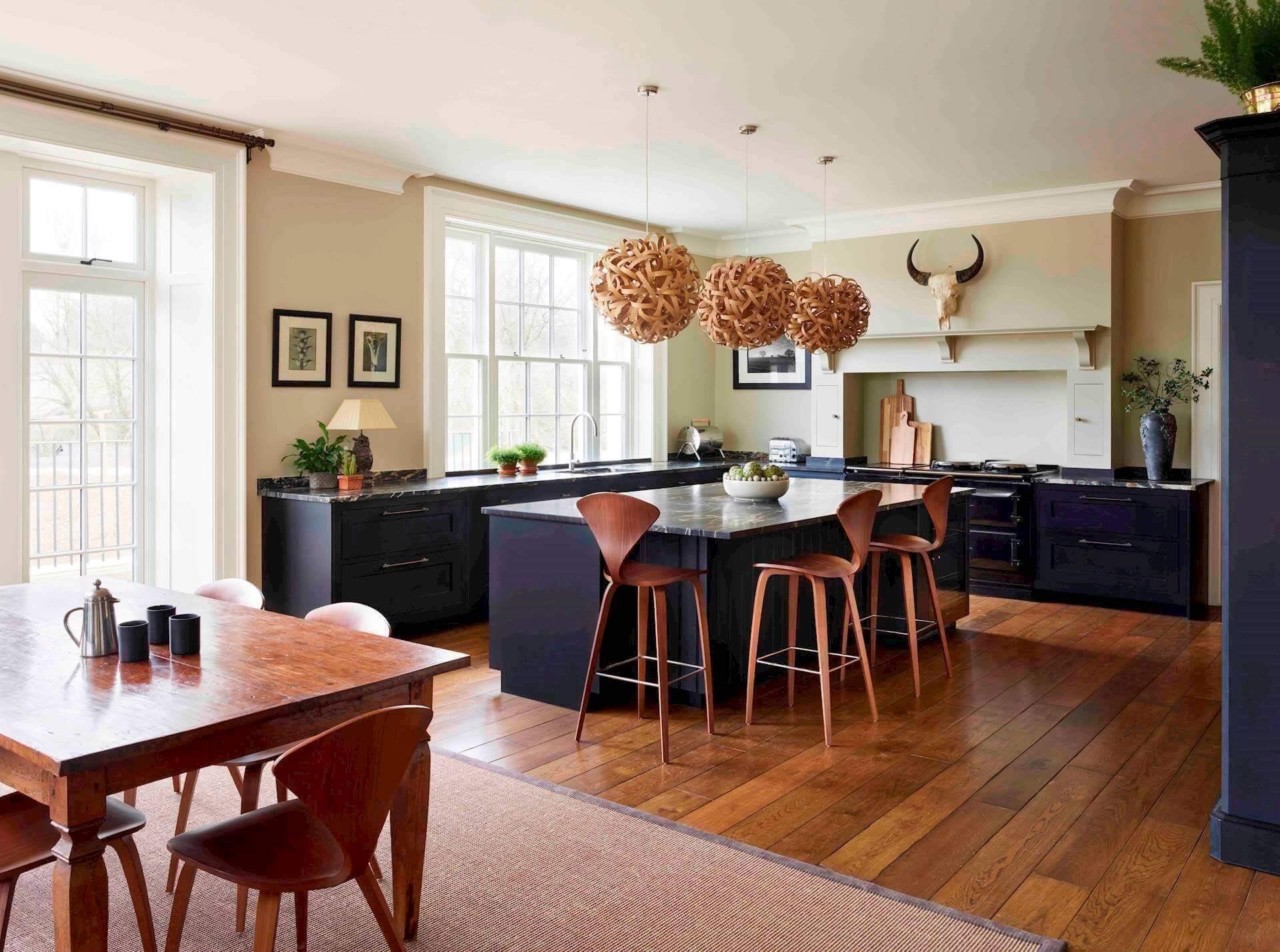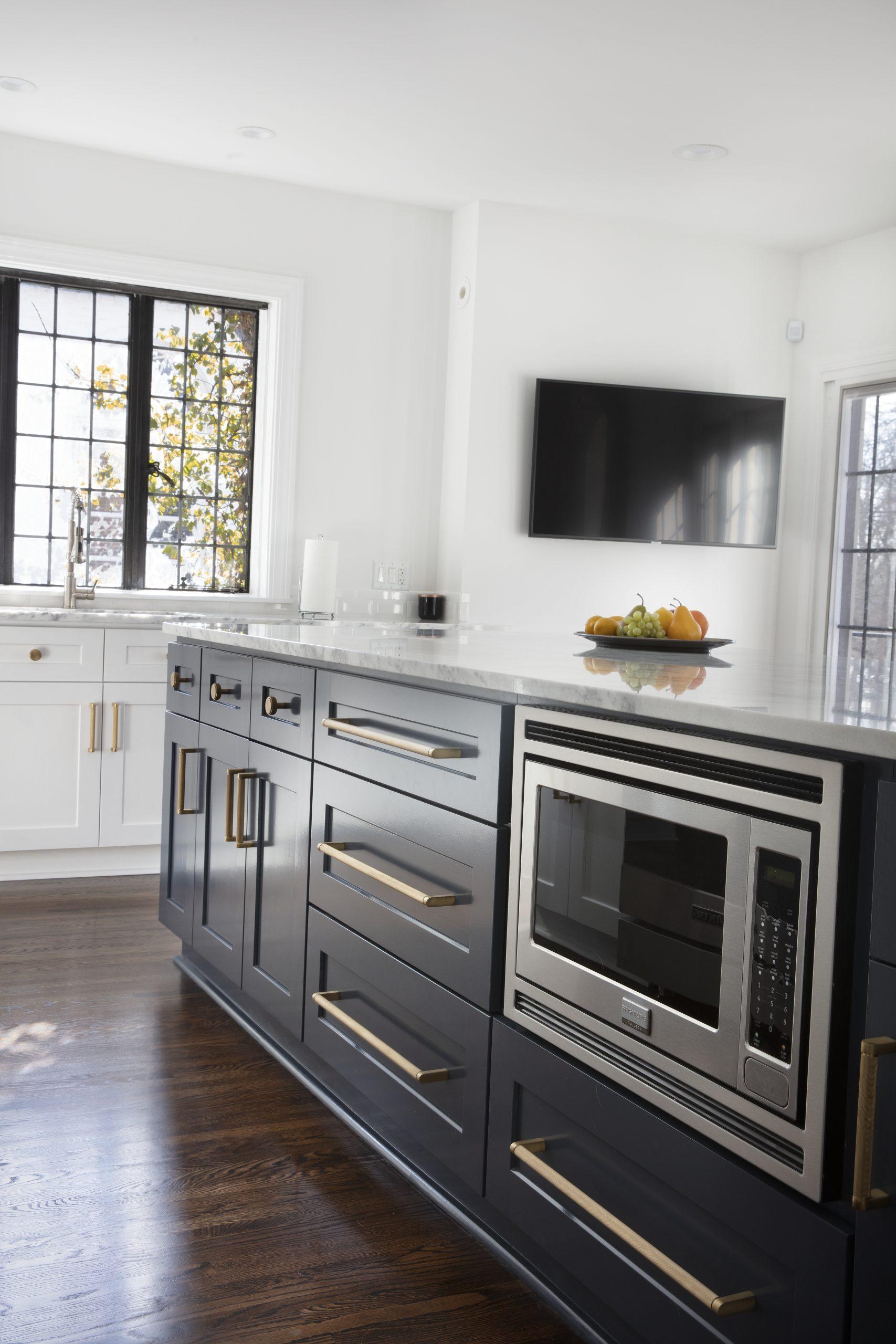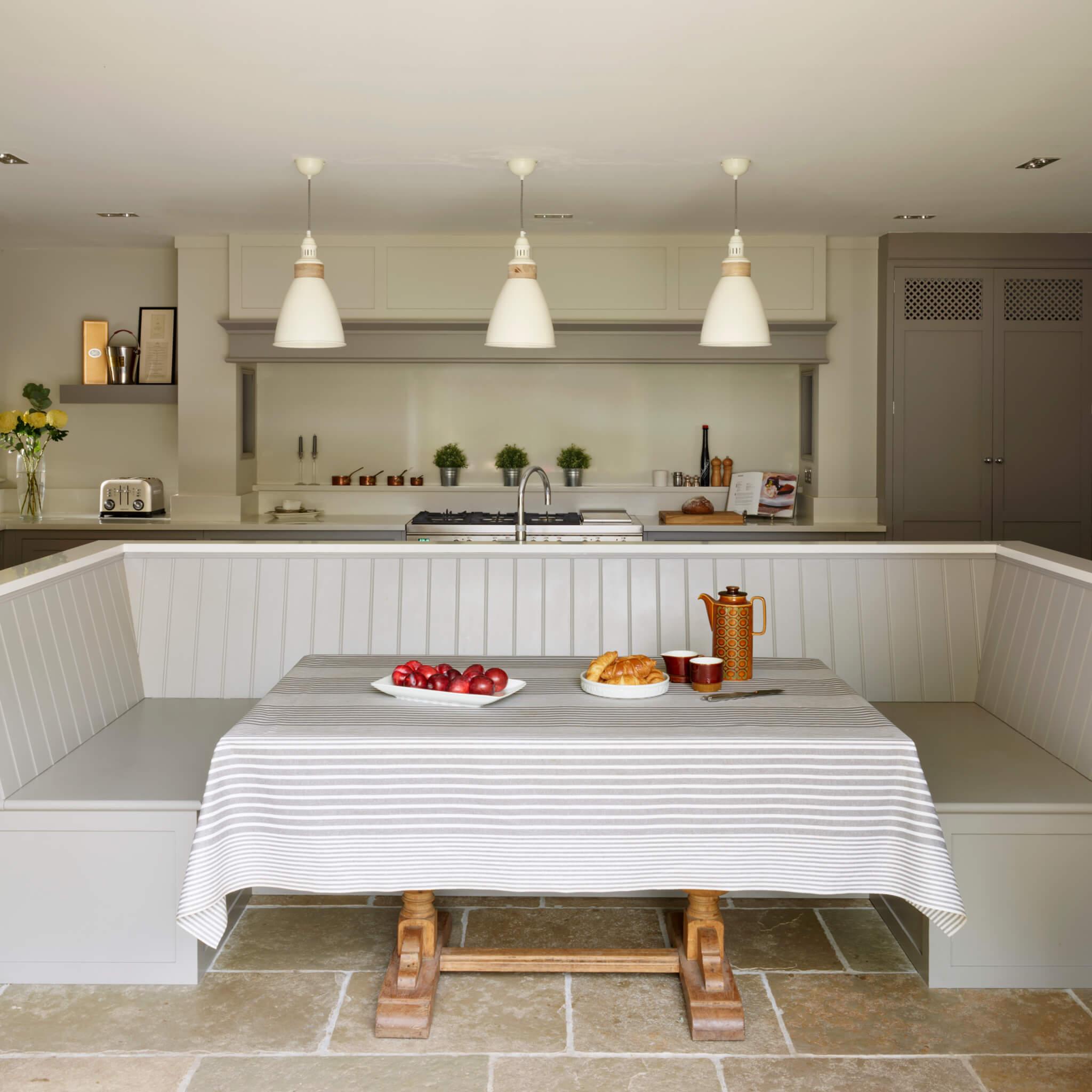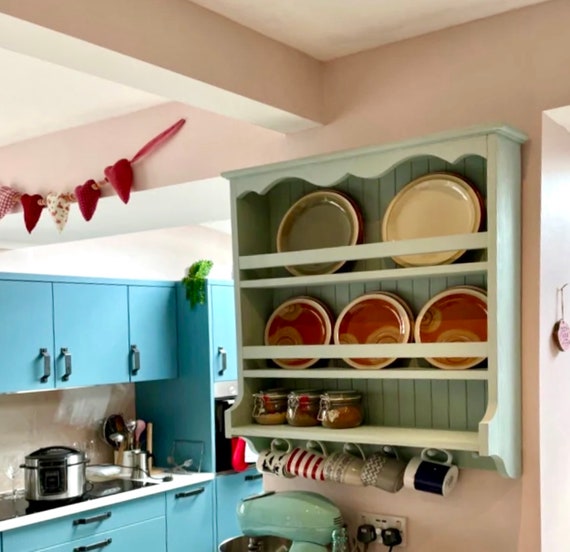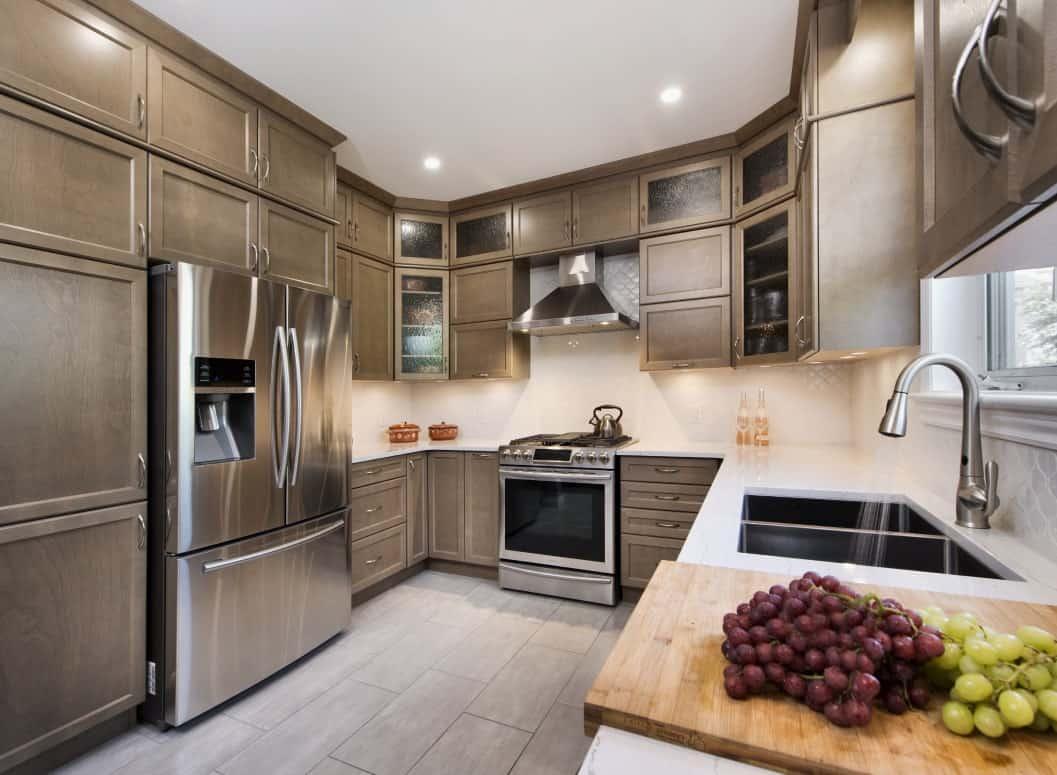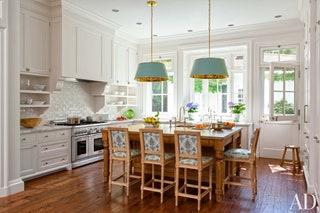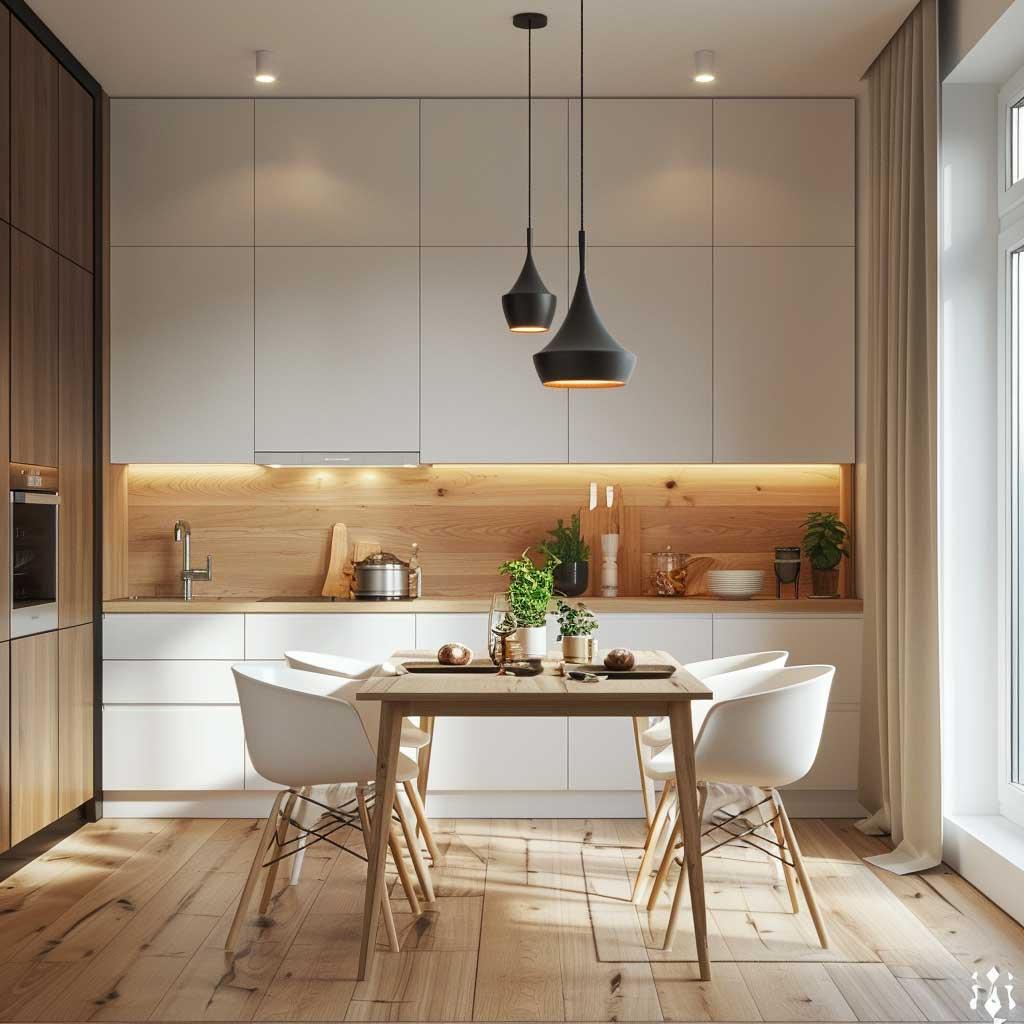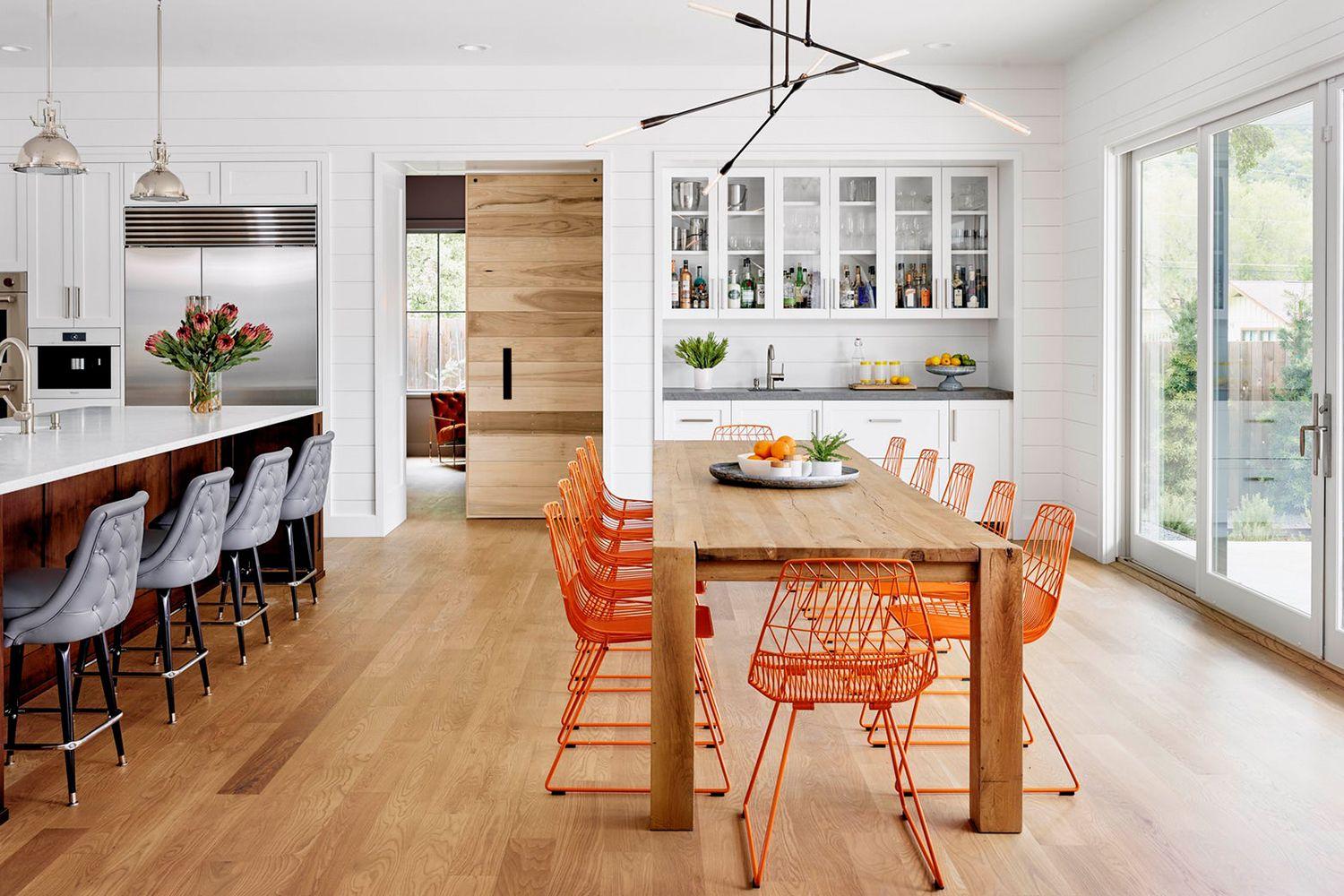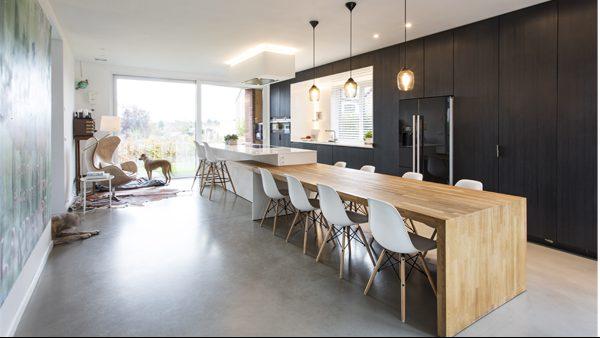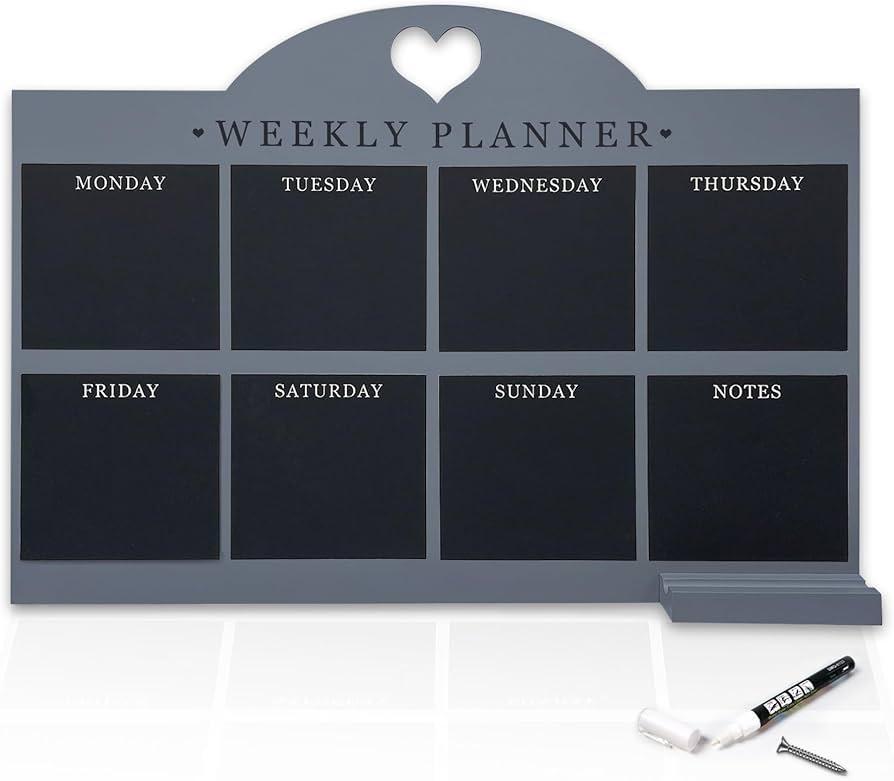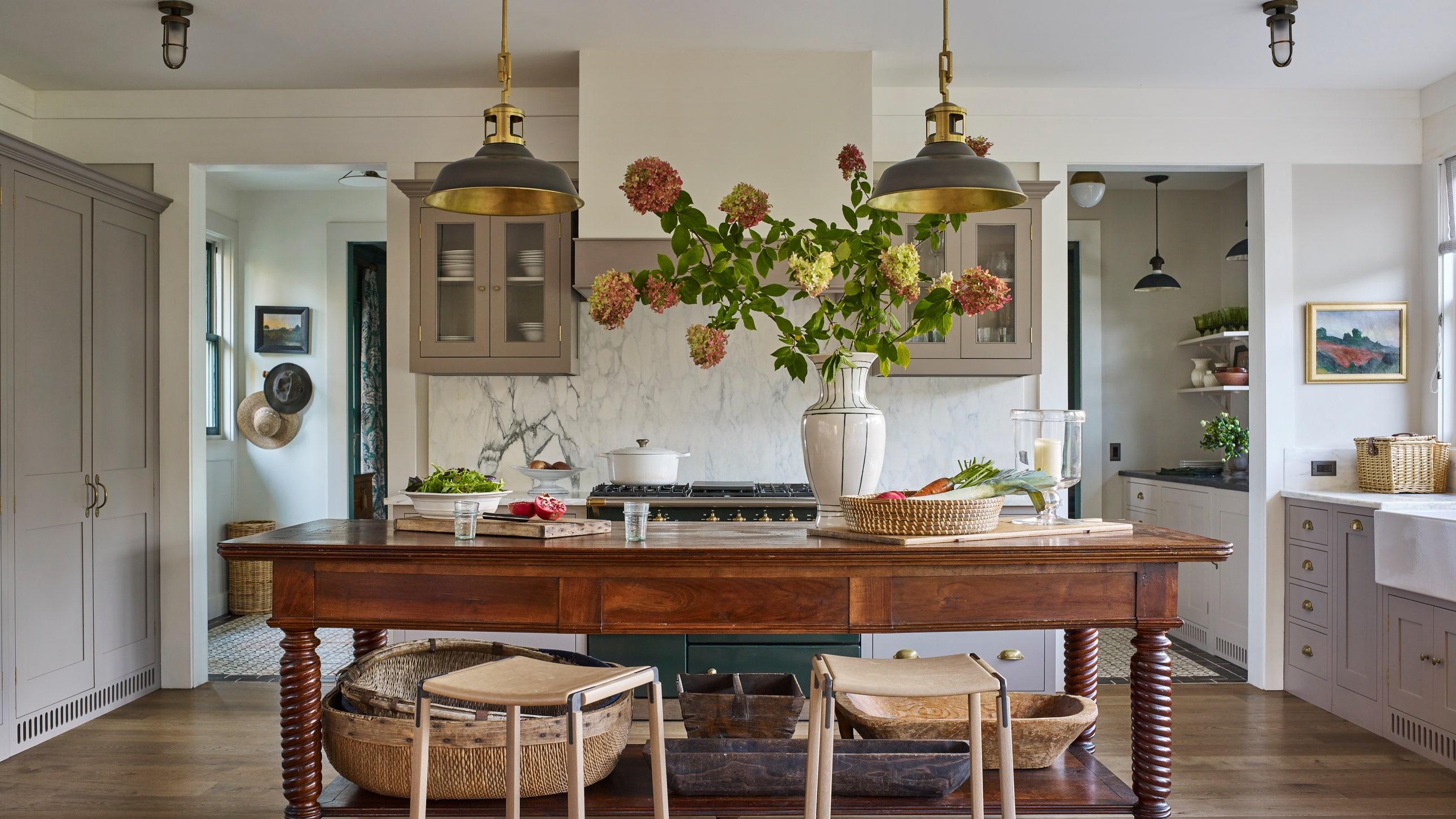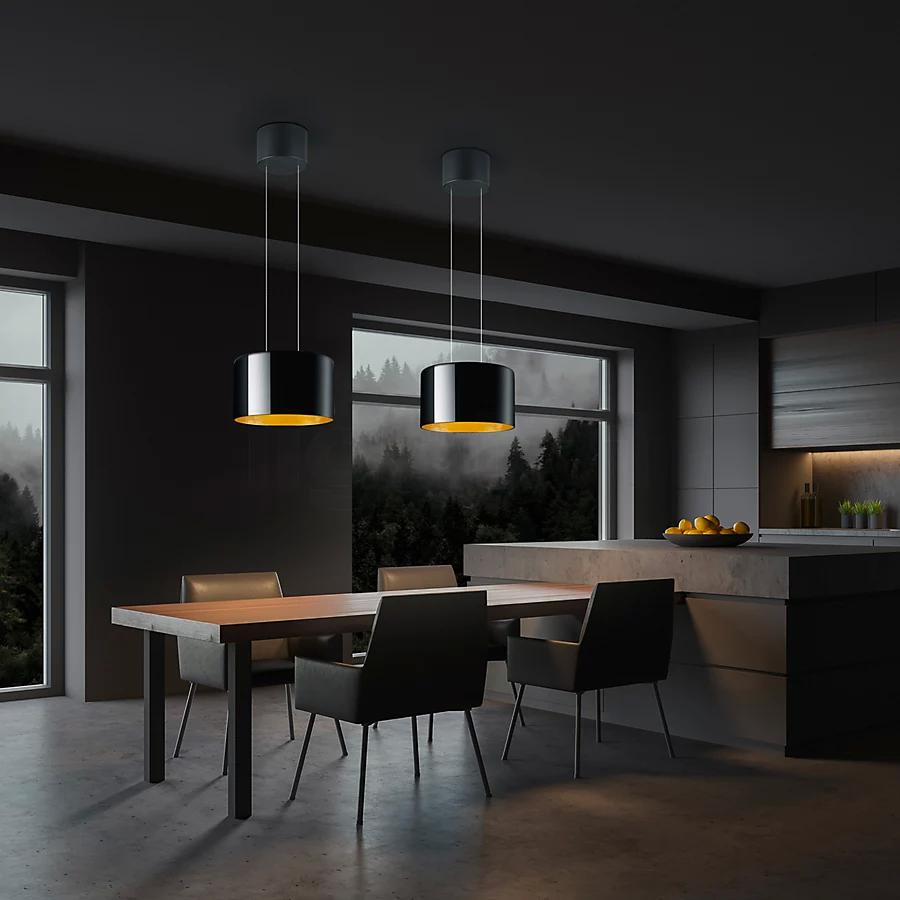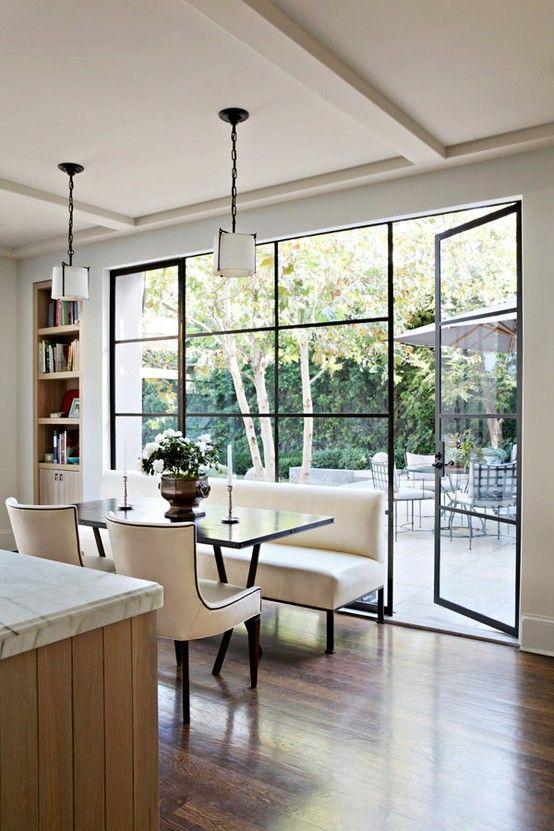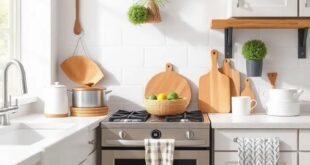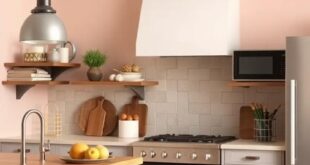Welcome to the heart of the home—the eat-in kitchen, where culinary magic meets everyday gathering. Have you ever found yourself daydreaming about the ideal space that seamlessly blends functionality with comfort? Whether you envision a cozy nook for family meals or a vibrant hub for entertaining friends, the ingredients for a perfect eat-in kitchen extend beyond mere appliances and décor. In this listicle, we’ll explore 24 essential elements that transform an ordinary kitchen into an inviting sanctuary. From layout and lighting to furniture and finishing touches, you’ll discover expert tips and innovative ideas that will inspire you to create a space that’s not just about cooking, but about connecting. Get ready to embark on a journey that will equip you with the knowledge to enhance your kitchen and bring your kitchen dreams to life!
A spacious layout encourages conversation and makes the Eat-In Kitchen inviting for gatherings
A well-designed eat-in kitchen should feel like an extension of your home, inviting family and friends to gather together. A spacious layout not only enhances mobility but also encourages a natural flow that fosters conversation. Imagine a layout that frames the central dining area, with easy access to cooking zones and refreshment stations. This arrangement promotes a sense of community, allowing guests to join in cooking, serving, or simply enjoying each other’s company.
To optimize your kitchen for gatherings, consider the following elements:
- Open Floor Plan: An unobstructed layout connects the kitchen to the living area, facilitating interaction.
- Comfortable Seating: Wide chairs or a banquette provide cozy spots for long conversations.
- Accessible Counter Space: Ensure easy access to countertops for food prep and serving, which can be a central point in your gathering.
- Central Islands with Bar Stools: An island can serve as a secondary dining area while also streamlining meal preparation.
Creating a welcoming ambiance is equally important. Here’s a small table highlighting features to enhance your eat-in kitchen’s inviting feel:
| Feature | Benefit |
|---|---|
| Natural Lighting | Brightens the space, making it feel warm and inviting. |
| Thoughtful Décor | Personal touches create a homey atmosphere that encourages relaxation. |
| Functional Layout | Ensures fluid movement for guests, promoting a lively exchange. |
By prioritizing a spacious and inviting arrangement, your eat-in kitchen truly becomes the heart of your home, perfect for gatherings large and small. For more ideas on maximizing space, you might want to visit Houzz for inspiration.
Comfortable seating is key; consider cushioned chairs or a cozy breakfast nook in your Eat-In Kitchen
Throughout the design of your eat-in kitchen, the choice of seating can dramatically influence both comfort and aesthetics. Opt for cushioned chairs that invite lingering over meals, ensuring that each family gathering becomes a cherished experience rather than a rushed affair. When selecting chairs, consider styles that complement your kitchen’s overall theme, whether it’s modern, rustic, or classic. For a truly intimate feel, incorporate a cozy breakfast nook with built-in bench seating, adorned with plush cushions that beckon to be enjoyed with your morning coffee or a weekend brunch. This not only maximizes space but also creates a welcoming corner that feels like a retreat within your home.
The arrangement of seating should promote conversation and connection, catering to both large family meals and quiet moments over a book. To enhance the atmosphere, consider adding small side tables to hold drinks or snacks, providing additional functionality without overcrowding the space. Here’s a simple chart to help you choose the best seating options for your eat-in kitchen:
| Seating Type | Pros | Cons |
|---|---|---|
| Cushioned Chairs | Comfortable and stylish | Can take up more space |
| Breakfast Nook | Space-saving and cozy | Less flexible for large gatherings |
By thoughtfully considering your seating options, you can create an inviting focal point that combines style and comfort, ensuring your eat-in kitchen is the perfect hub for meals and memories alike. For more inspiration on designing cozy spaces, check out House Beautiful for creative ideas and tips.
Ample natural light brightens the Eat-In Kitchen, enhancing its warmth and functionality
Incorporating ample natural light into an eat-in kitchen is not only an aesthetic choice but also a practical one that elevates both the ambiance and functionality of the space. Sunlight streaming through large windows or skylights creates an inviting atmosphere, making the kitchen a warm hub for family meals and gatherings. To optimize this lighting, consider using minimal window treatments or opting for sheer fabrics that allow light to filter through without compromising privacy. Additionally, placing mirrors strategically can bounce light around the room, further enhancing the bright feel.
Furthermore, the right color palette can amplify the benefits of natural light. Soft, neutral tones reflect sunlight beautifully, creating an airy and light-filled environment. Adding potted plants or herbs near windows can also bring life to the space while improving air quality. For a touch of flair, consider a functionality-enhancing dining table positioned in a well-lit area, using light-colored materials to maintain the bright and open feel. Don’t forget that harmonious lighting fixtures that mimic natural light can serve as a supplement during darker hours, ensuring that the warmth and functionality of your eat-in kitchen are constant throughout the day. Explore more on kitchen designs at Architectural Digest.
Functional storage solutions keep the Eat-In Kitchen organized and clutter-free for easy meal prep
To achieve an organized and clutter-free eat-in kitchen, investing in functional storage solutions is crucial. Consider incorporating open shelving for easy access to frequently used items. This not only saves space but also allows you to display charming dishes or decorative elements. Opt for magnetic spice racks mounted on the wall to keep your spices visible and within reach, streamlining meal prep and reducing the time spent searching for ingredients. Additionally, using stackable bins in your pantry can smartly categorize snacks, grains, and canned goods, making it simple to find what you need while keeping shelves tidy.
Another innovative idea is the use of rolling carts that can be moved around as needed. Whether for additional prep space or for housing utensils and gadgets, a stylish cart adds flexibility to your kitchen setup. Integrate a pull-out drawer system under your countertops for pots and pans, maximizing space efficiency and ensuring everything is concealed yet easily accessible. Lastly, consider a kitchen island with built-in storage—its multifunctionality allows for meal preparation while providing ample space to organize your cooking essentials. For more inspiration on kitchen organization, visit The Spruce.
Consider an island for additional counter space and a casual dining area in your Eat-In Kitchen
Adding an island can dramatically enhance the functionality and aesthetic of your eat-in kitchen. By incorporating an island, you create a dedicated workspace for meal prep while also providing much-needed extra counter space. This additional surface can serve as a magnet for family interaction, allowing for bustling activity as kids complete homework or friends gather for a casual chat while you cook. Choose materials that complement your kitchen’s design, such as a sleek quartz or rustic butcher block, and consider adding features like built-in storage or outlets for small appliances to maximize usability.
Moreover, an island acts as an informal dining area that promotes a relaxed atmosphere. You can equip it with comfortable bar stools or high-backed chairs to encourage long visits over breakfast or dinner. For a personal touch, incorporate decorative elements such as pendant lighting that not only illuminate the workspace but also create ambiance. Depending on your kitchen’s layout, it’s also worth considering a multi-level design that can separate dining from prep areas, further enhancing usability. For ideas and inspiration on kitchen islands, check out Houzz.
Stylish pendant lighting above the table creates ambiance in your Eat-In Kitchen for evening meals
Setting the right mood in an eat-in kitchen is crucial for transforming daily meals into memorable experiences. Stylish pendant lighting serves as not only a practical necessity but also a stunning decor element that elevates the overall ambiance. Choose elegant, modern fixtures that reflect your personality and harmonize with your décor. Consider styles such as sleek metal pendants, rustic glass globes, or even bohemian woven designs. Each option contributes to creating an inviting atmosphere where family and friends can enjoy delightful meals together, enticing anyone who walks in to take a seat at the table.
When positioned above the dining table, pendants should illuminate the space effectively without overwhelming it. This can be achieved through layered lighting; combine pendant lights with ambient and task lighting for versatility. Try experimenting with heights—hang the pendants low to create intimacy, or opt for multiple fixtures at varied heights for visual interest. Incorporating dimmer switches allows for adjustments depending on the occasion; bright for casual brunches and soft for romantic dinners. Remember to check out Houzz for more inspiration on unique pendant designs that can perfectly complement your kitchen décor.
A well-planned color scheme sets the mood and transforms your Eat-In Kitchen’s atmosphere
A thoughtfully designed color palette can evoke specific feelings and promote a welcoming environment in your eat-in kitchen. Embrace the power of color psychology to guide your choices, where neutral shades can create a calm atmosphere, while bold hues can energize the space. Consider using various tones to establish distinct zones within your kitchen, such as a lively area for breakfast or a serene corner for evening dining. Here are some color combinations to inspire your vision:
- Warm Earthy Tones: Terracotta, mustard yellow, and olive green for a cozy vibe.
- Cool Coastal Palette: Soft blues, sandy beiges, and crisp whites for a refreshing feel.
- Classic Black and White: Timeless elegance that fits any style.
- Pastel Accents: Pale pinks and mint greens to incorporate a playful touch.
When choosing your colors, remember that the finish can greatly affect the ambiance too. Matte finishes offer a modern, understated look, whereas a glossy sheen can reflect light, making space feel more open. For a harmonious approach, you can look into creating a color table that outlines how each shade influences mood. Consider the following framework to guide your selections:
| Color | Mood Effect | Ideal Usage |
|---|---|---|
| Yellow | Cheerful & Inviting | Accent Walls |
| Blue | Calming & Refreshing | Cabinets |
| Green | Restorative & Natural | Decorative Accessories |
Utilizing a coordinated color scheme can do wonders for your kitchen’s atmosphere, making it a true hub of comfort and connection. To help guide you further on color theory for your home, check out Houzz for inspiration and expert advice.
Incorporate durable countertops to withstand the daily demands of your busy Eat-In Kitchen
Choosing the right countertops is essential for functionality and durability in a bustling eat-in kitchen, where meals are prepped, homework is done, and family gatherings occur. Materials such as quartz, granite, and solid surface are excellent choices for their resilience and ease of maintenance. Quartz, for instance, is nonporous, making it resistant to stains and bacteria, while granite offers a unique charm with its natural veining and patterns. Solid surface countertops can be easily repaired and are available in many colors and finishes, allowing you to match them perfectly with your kitchen decor.
To make your choices even more informed, it’s helpful to compare their characteristics side by side. Here’s a quick table to guide you:
| Material | Durability | Maintenance | Cost |
|---|---|---|---|
| Quartz | High | Low | $$$ |
| Granite | High | Moderate | $$$ |
| Solid Surface | Moderate | Low | $$ |
Additionally, when selecting your countertops, consider edge profiles and thickness which can enhance both aesthetics and functionality. A thicker countertop not only looks more substantial but also provides more resistance against wear and tear. Moreover, explore options like integrated sinks that streamline the cleaning process and maximize workspace. Make your eat-in kitchen not just a place for meals but a hub for daily life, and you’ll appreciate the value of durable surfaces that stand up to the test. For more tips on kitchen design, visit houzz.com.
Use decorative accents like art or plants to personalize your Eat-In Kitchen space
To transform your eat-in kitchen into a warm and inviting space, consider incorporating decorative accents that reflect your personal style. Artwork, whether it’s a large canvas or a series of smaller framed pieces, can add color and character to your walls. Think about hanging a vibrant piece of art that speaks to you, or even creating a gallery wall that showcases a collection of prints, family photos, or culinary-themed art. Not only does this add visual interest, but it also makes the space feel uniquely yours. Additionally, consider using floating shelves to display smaller art pieces or pottery—this not only keeps things organized but also provides an opportunity to showcase your personality through your favorite items.
Coupling art with plants can enhance the organic feel of your eat-in kitchen, making it a true oasis in your home. Houseplants like herbs, succulents, and hanging plants can introduce freshness and a pop of color while also improving air quality. Create a small indoor herb garden on your windowsill for easy access while cooking and to enjoy a burst of greenery. If space allows, consider placing larger plants in corners or near seating areas. This combination of art and greenery not only personalizes your space but also creates a serene atmosphere where you can enjoy meals and social gatherings. Explore more ideas for incorporating plants into your kitchen at thespruce.com.
Ensure easy access to cooking essentials to streamline your efforts in the Eat-In Kitchen
To create an efficient and inviting eat-in kitchen, it’s essential to position your cooking essentials within arm’s reach. Start by designating a primary cooking zone that includes your most-used tools and ingredients. You can utilize drawer dividers or tiered shelving to organize items like spices, utensils, and frequently used pans. Consider incorporating a wall-mounted rack or magnetic strip for knives, allowing easy access while saving counter space. Storage solutions such as a rolling cart can also enhance mobility and keep necessary items at your fingertips, transforming cooking from a chore into a delightful experience.
Another way to streamline your kitchen efforts is by utilizing clear containers for pantry staples. This not only adds a clean aesthetic but also allows you to see what you have at a glance, reducing time spent rummaging through cabinets. Add a labeling system to identify the contents quickly, and position these containers on open shelves or a dedicated pantry area for convenience. When organizing your refrigerator, consider using bins for categories like dairy, produce, and snacks, ensuring that you make the most of your space. Implementing these strategies will transform your eat-in kitchen into a well-organized sanctuary for food lovers, paving the way for smooth meal prep and enjoyable family gatherings. For more storage inspiration, visit Houzz.
A focal point, like a unique table or backsplash, adds visual interest to your Eat-In Kitchen
Incorporating a unique table or a stunning backsplash into your eat-in kitchen can dramatically elevate its aesthetic appeal. A specially designed dining table can serve as a striking centerpiece, drawing the eye with its shape, material, or color. Consider options like a reclaimed wood table for a rustic charm, or a sleek glass table for a modern touch. Backslashes are equally transformative; a colorful mosaic or a bold patterned tile can create a captivating backdrop that sets the tone for your culinary haven. Not only do these elements serve functional purposes, but they also tell a story, inviting conversation and engagement during meals.
To further enhance the focal point in your eat-in kitchen, consider the following stylish options that can complement your table or backsplash:
- Statement Lighting: Pendant lights or chandeliers that align with the table’s style.
- Artistic Centerpieces: Floral arrangements or sculptural pieces that reflect your personal taste.
- Unique Bar Stools: Cushioned or backless stools can add flair and comfort.
- Themed Decor: Incorporate elements like cookbooks or vintage serving dishes that harmonize with your kitchen’s color scheme.
By carefully choosing your focal point and surrounding decor, you will create a space that is visually engaging and inherently inviting. For more ideas on kitchen design inspiration, visit House Beautiful.
Choose a practical flooring option that complements the design while ensuring comfort in the Eat-In Kitchen
When selecting flooring for your eat-in kitchen, the balance between style and comfort is essential. Opt for materials that can withstand the hustle and bustle of daily life while adding to the overall aesthetic. Vinyl is a top contender, offering a variety of designs including wood and tile looks, while providing a soft, cushioned feel underfoot. Not only is it water-resistant, but it’s also easy to clean, making it ideal for families. Similarly, laminate flooring offers an attractive wood-like finish without the maintenance; it’s durable and can resist scratches and dents, ensuring your eat-in kitchen maintains its charm for years.
Another great choice is cork flooring, which brings warmth and absorbs sound, creating a cozy ambiance conducive to conversation and family gatherings. Additionally, it’s eco-friendly and provides a certain unique character that complements diverse kitchen styles. If you’re leaning towards a more traditional look, natural stone tiles like travertine can add a touch of elegance while being strong and durable. As you consider your flooring choice, remember to factor in area rugs, which can enhance comfort and add a splash of color, making the space feel inviting and stylish. For further inspiration on flooring styles, check out Houzz.
Smart appliances save time and energy, enhancing efficiency in your modern Eat-In Kitchen
In the heart of your modern eat-in kitchen, smart appliances revolutionize the way you cook, clean, and even socialize. Imagine a refrigerator that alerts you when you’re low on essentials or an oven that allows you to preheat from your smartphone while you’re still at the grocery store. These innovative tools not only streamline daily tasks but also maximize energy efficiency, reducing both your utility bills and your carbon footprint. Smart devices automatically adjust energy consumption based on usage patterns, ensuring that your kitchen remains eco-friendly and economical.
What’s more, the integration of smart technology enhances meal preparation and planning, giving you more time to enjoy with family and friends. With features like voice commands, automated cooking programs, and connectivity to recipe apps, these appliances make it easier than ever to whip up healthy, delicious meals. Consider the following smart appliances that truly elevate your kitchen experience:
- Smart Refrigerator: Monitors inventory and sends reminders for groceries.
- Wi-Fi-Enabled Oven: Lets you preheat remotely and access recipes directly from the display.
- Smart Dishwasher: Schedules washes based on your usage patterns and displays energy efficiency data.
- Instant Pot Smart Cooker: Combines multiple cooking functions and allows for remote programming.
To further highlight the benefit of incorporating these gadgets into your kitchen, consider the table below showcasing energy usage for traditional vs. smart appliances:
| Appliance Type | Energy Usage (kWh/year) | Smart Feature |
|---|---|---|
| Standard Refrigerator | 730 | Inventory tracking |
| Conventional Oven | 400 | Remote access |
| Traditional Dishwasher | 300 | Usage pattern analysis |
| Instant Pot | 150 | Cooks multiple meals |
Smart technology in the kitchen simplifies our lives, allowing us to focus on what truly matters—creating memories around the table. Discover more about enhancing your kitchen with modern technology at Consumer Reports.
Built-in benches maximize seating while blending design elements in your Eat-In Kitchen
Incorporating built-in benches into your eat-in kitchen not only enhances the functionality of your space but also adds a seamless design element that can elevate the overall aesthetic. These benches can be custom-designed to fit your kitchen layout perfectly, making the most of corner or awkward spaces that traditional seating might not accommodate. Choose materials and finishes that complement your existing décor—a cozy wood bench with plush cushions can offer a rustic charm, while a sleek, modern design can lend an air of sophistication. Consider integrating storage solutions beneath the seating to maximize utility and minimize clutter.
Moreover, the style of the built-in benches can serve as a focal point in your kitchen. Utilize a variety of colors and textures to create visual interest and maintain harmony with surrounding elements. It’s beneficial to incorporate features such as removable upholstery for easy cleaning, and you can tie in your kitchen’s color scheme with decorative pillows. Adding a table that matches or contrasts can also enhance the overall look, creating a space where family and friends will want to gather. Remember that clever lighting, such as pendant lights above your bench area, can highlight this unique seating option and foster a warm ambiance perfect for socializing over meals. For more ideas and inspiration, check out houzz.com.
Open shelving displays beautiful dishware, adding personality to your Eat-In Kitchen while saving space
Utilizing open shelving in your eat-in kitchen is a brilliant way to showcase your most beautiful dishware while maximizing your space. With carefully curated display options, open shelves transform functional storage into a visual delight. Imagine your favorite dinnerware, vibrant mugs, and vintage glassware organized for easy access and aesthetic appeal. It allows you to express your unique style while making every meal feel like a special occasion. This method not only keeps your kitchen feeling open and airy but invites a cozy atmosphere where family and friends can gather comfortably.
When it comes to selecting the items for your open shelving, consider a mix of colorful plates, artistic bowls, and charming serving pieces. Here are some ideas for what to display:
- Seasonal dishware: Rotate your pieces to keep the display fresh and relevant.
- Heirloom treasures: Include pieces that tell a story or have sentimental value.
- Color coordination: Use a color palette that complements your kitchen decor.
- Functional items: Let your most-used items be part of the aesthetic, blending function with style.
To ensure an organized display that remains functional, consider these smart tips:
| Tip | Description |
|---|---|
| Group by Size | Place larger items on the bottom shelves for stability. |
| Use Baskets | Incorporate stylish baskets for smaller items to avoid clutter. |
| Vertical Space | Maximize height by using stackable dishes and decor. |
By carefully selecting what to display, you create a beautiful focal point in your eat-in kitchen that is both functional and reflective of your personal style. For more inspiration, check out House Beautiful for ideas on how to make open shelving work in your space.
Incorporate a mix of textures through fabrics and materials for a layered look in your Eat-In Kitchen
Creating a visually stunning eat-in kitchen requires a careful balance of textures that can elevate the space and enhance the overall aesthetic. Start by layering a variety of fabrics and materials to add depth and interest. Consider mixing soft linens for curtains or table runners with the rugged look of jute or sisal area rugs. Adding a touch of luxury with velvet or suede dining chairs can soften the overall appearance while also providing comfort. A bold choice of upholstery on barstools or cushions can further enhance the eclectic feel, or introducing quirky patterns can breathe personality into a streamlined design.
Don’t overlook the role of kitchen accessories in achieving that layered look. Combining materials like ceramic dishware, glassware, and wooden serving platters creates a rich tapestry of textures that invite both the eye and the hand. Incorporate metal accents—think copper pots or brass fixtures—to add a modern edge and contrast against softer materials. A carefully curated collection of decorative elements, such as a mix of woven baskets and stoneware, can also make the kitchen feel warm and inviting. For more inspiration, explore websites like housebeautiful.com that showcase stylish kitchen ideas.
A family-friendly layout promotes interaction and enjoyment during meals in the Eat-In Kitchen
Creating a welcoming and interactive environment is key in a family-oriented eat-in kitchen. A carefully designed layout encourages conversation and bonding, as family members gather around a central table. To enhance this dynamic, consider the following elements that invite participation:
- Open Concepts: Use an open floor plan that connects the kitchen with adjacent living spaces, minimizing barriers and promoting fluid movement.
- Large Dining Table: Opt for a generously sized table where everyone can sit comfortably, making mealtimes feel inclusive.
- Flexible Seating: Incorporate versatile seating options like benches or movable chairs, allowing easy rearrangement for gatherings.
- Interactive Kitchen Island: A kitchen island with bar stools creates a casual spot for family members to join in cooking or simply chat while meals are prepared.
- Kid-Friendly Zones: Designate areas for children with smaller tables or stools, so they can enjoy their meals or engage in arts and crafts nearby.
Incorporating these features not only elevates the functionality of your eat-in kitchen but also sets the stage for memorable family moments. Consider using Houzz for inspiration on layout designs that foster interaction and enjoyment. Additionally, utilizing materials that are easy to clean can help alleviate post-meal stress, allowing families to focus more on their time spent together rather than the mess created.
Select an inviting color palette to create a warm atmosphere in your Eat-In Kitchen
To cultivate a warm and inviting atmosphere in your eat-in kitchen, choosing the right color palette is key. Warm neutrals like soft beige, buttery cream, or light taupe create a cozy backdrop that fosters comfort and relaxation. Accentuating these shades with earthy tones such as terracotta, olive green, or soft mustard can bring a touch of nature indoors, evoking feelings of warmth and groundedness. Combine these with pops of deep, muted colors like navy blue or burgundy for an inviting contrast that adds depth without overpowering the space.
Don’t forget the role of accents in your color scheme. Consider incorporating metallics such as copper or brushed gold for fixtures and accessories, as they can reflect light and create a welcoming radiant effect. Textiles like curtains, cushions, and table linens can feature patterns with your chosen palette to add interest. Aim for a balanced mix of textural elements like wood, stone, and fabric, which can help to soften the overall look and enrich the inviting environment. Experiment with these suggestions to find a combination that resonates with your style—after all, a harmonious space promotes good conversation and memories over shared meals. For additional inspiration, visit Houzz and explore a variety of kitchen styles.
Keep your Eat-In Kitchen clutter-free with designated zones for cooking, eating, and cleaning
To master the art of an organized eat-in kitchen, it’s essential to create designated zones that streamline activities. The cooking zone should be equipped with all essential appliances and utensils within arm’s reach. This includes pots, pans, cutting boards, knives, and spice containers. Keep a tidy countertop by utilizing drawer organizers for utensils and mounting racks for pots and pans. For the eating zone, consider a rustic dining table that accommodates family and guests comfortably, while stylish placemats and centerpieces enhance the dining experience. Use designated shelves or cabinets for dishes, glasses, and cutlery to ensure everything is easily accessible during meal times.
The final cleaning zone should be strategically located to facilitate easy access to cleaning supplies and dishware after meals. Incorporate a pull-out trash bin and a recycling unit beneath the sink for convenience. Equip this zone with a dish drying rack that can be tucked away when not in use to minimize visual clutter. Use labeled bins or baskets to store cleaning supplies neatly, ensuring a sense of order throughout the kitchen. By thoughtfully dividing the space based on activity, you can maintain a serene atmosphere where cooking, dining, and cleaning coexist harmoniously. Explore more about kitchen organization at The Spruce.
A breakfast bar provides a casual spot for quick meals in your Eat-In Kitchen
A breakfast bar transforms your eat-in kitchen into a laid-back haven for enjoying quick meals with family or friends. This casual dining spot, often perched on stylish stools, encourages spontaneous brunches and coffee chats without the formality of a full dining table setup. Whether you’re racing through your morning routine or unwinding with a light evening meal, a breakfast bar offers an ideal solution for both functionality and style. Incorporating design elements like a sleek countertop and ample lighting can elevate the experience, making it not only a place to eat but also a focal point for your kitchen.
Furthermore, adding storage solutions underneath the counter can maximize space while keeping essentials within easy reach. Consider options like pull-out drawers or stylish baskets to house everything from breakfast dishes to cookbooks. You can create a cozy atmosphere by including decorative accents such as fresh flowers or seasonal decor on the countertop. To see various breakfast bar designs and ideas that can fit into any kitchen style, check out houzz.com for inspiration.
Incorporate wall-mounted boards for notes and menus, adding function to your Eat-In Kitchen
Enhancing the functionality of your eat-in kitchen can be as simple as incorporating wall-mounted boards for notes and menus. These boards serve as a central hub for your family’s daily activities, keeping everyone informed about meal plans, grocery lists, and important reminders. You can choose from a variety of materials such as chalkboards, corkboards, or whiteboards, each offering unique aesthetics and usability. Personalize these boards with colorful markers or fun magnets to match your kitchen’s decor. Adding a dedicated space for recipes can also encourage cooking together as a family, making meal prep a communal activity.
In addition to practical notes, a wall-mounted board can showcase your culinary creativity. Reserve sections for crafting weekly menus or even a spot for a rotating list of family favorites. To elevate the organization further, consider grouping your notes with decorative clips or washi tape. Keeping this visual element tidy and engaging not only brings order to your cooking routine but adds an artistic flair to your kitchen walls. Explore more DIY ideas for these boards at The Spruce for inspiration!
Invest in quality plumbing fixtures for both style and practicality in your Eat-In Kitchen
Quality plumbing fixtures are not just functional; they can dramatically enhance the aesthetic appeal of your eat-in kitchen. With options that range from sleek and modern designs to classic and rustic styles, you can choose fixtures that complement your overall kitchen decor. Faucets can be a focal point in your kitchen—consider investing in a statement piece with pull-down sprayers or touchless technology for added convenience. Sinks also come in various materials, such as stainless steel, porcelain, or even natural stone, allowing you to select what best fits your style while ensuring ease of maintenance and durability.
Moreover, the practicality of high-quality fixtures shouldn’t be overlooked. Opt for high-efficiency models that save water without sacrificing performance. Many modern faucets come equipped with features like water-saving aerators and easy-to-clean finishes, ensuring your kitchen remains both stylish and functional. You might also want to explore smart faucets that integrate with home automation systems, offering hands-free control and temperature regulation. When selecting your products, consider visiting sites like Home Depot to explore a wide array of options that blend quality, style, and practicality.
Add flexible lighting options to cater to different moods and occasions in your Eat-In Kitchen
- Dimmer Switches: Installing dimmer switches allows you to easily adjust the brightness of your lighting. Whether you’re hosting a lively dinner party or enjoying a quiet breakfast, you can create the perfect ambiance with just a flick of a switch.
- Layered Lighting: Combine ambient, task, and accent lighting for a dynamic atmosphere. Use ceiling fixtures for general lighting, pendants over the table for task light, and wall sconces or under-cabinet lighting for a cozy glow.
| Lighting Type | Function | Suggested Bulb |
|---|---|---|
| Ambient Lighting | General illumination | LED round bulbs |
| Task Lighting | Focused lighting for cooking/eating | Bright LED or CFL bulbs |
| Accent Lighting | Create focal points | Warm white LEDs |
- Smart Lighting: Consider integrating smart bulbs or lighting systems that can be controlled via an app. This not only offers convenience but also allows you to customize colors and settings to match any occasion.
- Natural Light: Maximize natural light with strategically placed mirrors and window treatments. Reflecting light can brighten up your eat-in kitchen during the day, enhancing the overall mood.
For more ideas and resources on how to enhance your kitchen lighting, check out Home Depot.
Create a seamless indoor-outdoor flow with large windows or doors in your Eat-In Kitchen
Enhancing the connection between your eat-in kitchen and the outdoor space can transform your dining experience, creating a serene retreat where meals become an extension of nature. Large windows and doors act as invites to the outside world, allowing natural light to flood the space while providing stunning views of your garden or patio. Choose either sliding glass doors, which can be opened to merge the two spaces seamlessly, or expansive picture windows that let in light without obstructing your view. Consider using framed bifold doors that can open up completely, blurring the boundaries between indoor and outdoor dining.
To maximize the benefits of these architectural features, consider the following design elements:
- Transom Windows: These small windows positioned above doors add height and light.
- Sliding Screens: To keep insects at bay while allowing fresh air in.
- Decking Materials: Choose similar flooring for both spaces to maintain continuity.
- Strategic Landscaping: Use potted plants near your wide openings to create a welcoming transition.
By creatively integrating these elements into your eat-in kitchen, you can cultivate a harmonious atmosphere that promotes culinary creativity and social interaction. For inspiration and more ideas on creating a cohesive indoor-outdoor living space, visit Houzz.
Concluding Remarks
As we wrap up our exploration of the 24 essential elements for a perfect eat-in kitchen, it’s clear that this vital space is more than just a functional area for meal preparation and dining. It’s a canvas for creativity, a hub for family connections, and a reflection of your personal style.
Whether you’re inspired by rustic charm, modern minimalism, or a vibrant eclectic blend, each element highlighted in this list can be a building block toward crafting your ideal kitchen—a place where flavors come alive, laughter rings out, and memories are made over shared meals.
Remember, the perfect eat-in kitchen is not merely about aesthetics; it’s about creating an environment that accommodates your lifestyle and fosters connections with those you love. So, take these ideas, infuse them with your own flair, and embark on the journey to transform your kitchen into the heart of your home. Happy designing!
As an Amazon Associate I earn from qualifying purchases.
 decorafit.com Design ideas for your home and patio
decorafit.com Design ideas for your home and patio
